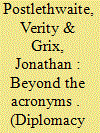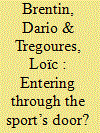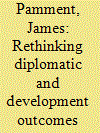|
|
|
Sort Order |
|
|
|
Items / Page
|
|
|
|
|
|
|
| Srl | Item |
| 1 |
ID:
146050


|
|
|
|
|
| Summary/Abstract |
Diplomacy often finds itself reduced to actions centred on states. However, after the Cold War, international relations and diplomacy have expanded with different actors growing into significant roles, particularly in the increase of diplomatic relations in the context of sport. The classification and significance of other actors remains under-researched in relation to sport, with literature focusing more on the growth of new and varying practices of diplomacy. This analysis contends that there is a need to interrogate fundamental components of modern diplomacy—with the actor being the focus—more specifically the classification of sports organisations in diplomacy. It is relevant as a more accurate understanding of sports organisations will contribute to how diplomatic studies can analyse and evaluate modern diplomacy within the context of sport. The International Olympic Committee is the actor used to illustrate how problematic classifications currently in the academic literature translate into weak and reduced analysis and evaluation of its role and significance in diplomacy. As counterpoint, this analysis proposes an analytical framework of socio-legal theory that harnesses legal regulation as a benchmark to classify an actor’s capacity within a society. In consequence, the IOC is as an active and significant contributor to the ever expanding and complex diplomatic environment and wider society.
|
|
|
|
|
|
|
|
|
|
|
|
|
|
|
|
| 2 |
ID:
146053


|
|
|
|
|
| Summary/Abstract |
In December 2014, the International Olympic Committee [IOC] granted full membership to Kosovo. For the young state, which had declared its independence only in 2008, this decision meant that it could take part in the upcoming 2016 Summer Olympic Games in Rio de Janeiro. This analysis illustrates the significance of Kosovo’s full IOC membership. Arguing that IOC membership can be identified as both the “end” and “beginning” of Kosovo’s diplomatic endeavour towards international recognition, the role of sport within this process is illuminated. It mirrors the strategic value of representative sport for a nation-building process as well as its particular significance for public diplomacy in Kosovo. Kosovar political elites shifted their focus towards sport because “traditional” diplomatic efforts, despite being successful to a certain extent, could not break the seemingly cemented status quo considering its United Nations [UN] status. Inclusion in the “Olympic family” represents more than just a symbolic victory for Kosovar diplomacy. The Kosovar nation-building and -branding process, emblematised through the “soft power” of representative sport, could be increasingly used to create symbolic pressure on states that have not yet recognised Kosovo; its ultimate diplomatic goal remains to enter the UN, even if it has to be through “sport’s door.”
|
|
|
|
|
|
|
|
|
|
|
|
|
|
|
|
| 3 |
ID:
146048


|
|
|
|
|
| Summary/Abstract |
Joseph Nye’s concept of “soft power” has become an increasingly used term to help explain why states—including so-called “emerging states”—are paying greater attention to acquiring various forms of cultural and political attraction. However, within mainstream International Relations, Political Science, and Sport Studies literature, a continuous debate remains as to what actually constitutes soft power, how national leaders go about acquiring it, and how forms of attraction convert into power outcomes in both the short- and long-term. This analysis endeavours to overcome these issues by offering an “ideal type” model that details states’ soft power strategies, the mechanisms they use, and the tangible future outcomes they gain.
|
|
|
|
|
|
|
|
|
|
|
|
|
|
|
|
| 4 |
ID:
146045


|
|
|
|
|
| Summary/Abstract |
In attending the London Olympic Games of 2012, competitors and visitors at each venue were greeted with four flags; from left to right, they were the International Olympic flag—and the International Paralympic flag subsequently—the flags of the United Nations [UN] and the London Olympic Organising Committee [LOCOG], and the British Union Jack.
|
|
|
|
|
|
|
|
|
|
|
|
|
|
|
|
| 5 |
ID:
146049


|
|
|
|
|
| Summary/Abstract |
Whilst the link between international diplomacy and the Olympic movement has been the subject of extensive academic and journalistic enquiry, the experience of diplomatic discourse relating to the relatively youthful Paralympic movement has received little attention. It occurs not just in the context of state diplomacy, where for example the Paralympic Games may provide a conduit for the pursuit of specific policy objectives, but also in relation to the engagement of the International Paralympic Committee [IPC] as an evolving non-state actor in the diplomatic process. The idea of the IPC as an advocacy body engaged through public diplomacy in promoting disability rights needs exploration as an element of the contemporary politics of disability. This analysis considers the relationship between the activities of the IPC and wider lobbying by disabled people’s organisations as a means of leveraging change in domestic and international policy toward disability. In relation to the global development agenda, it also assesses IPC responses to the gulf in resourcing for para-sport as well as related health and education provision between high- and low-resource regions. It considers the response of the organisation from the perspective of public diplomacy and locates that response within the wider diplomacy of development.
|
|
|
|
|
|
|
|
|
|
|
|
|
|
|
|
| 6 |
ID:
146047


|
|
|
|
|
| Summary/Abstract |
Sport diplomacy provides a challenging example of how diplomatic practice is changing in light of a proliferation of actors, agendas, and modes of communication. This context has inspired greater interest in techniques for managing the participation of others in the pursuit of desired outcomes, such as debates surrounding multi-stakeholder diplomacy, public diplomacy, and soft power. However, these debates often derive from an instrumentalist perspective of exerting influence and securing outcomes. Sport, on the other hand, involves sites and practices capable of supporting communities in the identification of their own goals, and of supporting the development of strategies and skills that can achieve those goals. Its participatory qualities challenge instrumentalist approaches to diplomatic objective setting, and potentially reveal some of the ways in which diplomacy can be more diffuse and inclusive. This article uses the example of sport diplomacy to question the basis for instrumentalist diplomatic objective setting and to explore the theoretical basis for participatory models of multi-stakeholder diplomacy.
|
|
|
|
|
|
|
|
|
|
|
|
|
|
|
|
| 7 |
ID:
146046


|
|
|
|
|
| Summary/Abstract |
The actors, or “players,” involved in the transactions of diplomacy occasioned by sport are manifold. In the case of the world’s “global game”—association football—they include but are not limited to individual footballers, football clubs, national leagues, national associations, football’s international governance structures, multi-national sponsors, and numerous hangers on. Importantly for this analysis, such a panoply of actors creates an architecture, replicated across other sports, which speak to the necessity of furthering the understanding of the relationship between sport and diplomacy. These two phenomena share a long-standing similarity in global affairs; both having been over-looked as means of comprehending relations between different polities otherwise centred on the nation-state. This exegesis advances our understanding in two areas. First, it addresses the parameters of the discussion of “sport and diplomacy” and problematises the discourse between the two with a note on language; and second, it utilises a framework provided by an appreciation of “global diplomacy” to explore concepts of communication, representation, and negotiation in sport and diplomacy.
|
|
|
|
|
|
|
|
|
|
|
|
|
|
|
|
| 8 |
ID:
146051


|
|
|
|
|
| Summary/Abstract |
International sport, as Geoffrey Pigman has correctly observed, emerged “as a quintessential case study demonstrating the part that public diplomacy plays in contemporary diplomacy.” The British Empire Games/Commonwealth Games [BEG/CG] are one such example, being the second largest multi-national multi-sport event today. Their origins lie in the interwar era when members of sporting organisations, many of whom were active in other formal aspects of public life, considered the organisation of specific Imperial events through international networking. Described as lacking a “thoroughly analytical and interpretive account of their history,” questions of identity politics, public diplomacy and statecraft are at their core because the BEG, inaugurated in 1930, represented qualities and values that appealed to governments, civil society, and sportspeople alike. In the waning of the British Empire, the BEG was one attempt to maintain Imperial prestige and cement cultural bonds. Yet, not only is there an absence of analytical accounts of their history, but the inter-relationships between the BEG and diplomacy, and among global sport and diplomacy more broadly, have been similarly under-investigated. This absence is striking, representing a missed opportunity in understanding the development of global sport and international relations more generally.
|
|
|
|
|
|
|
|
|
|
|
|
|
|
|
|
| 9 |
ID:
146052


|
|
|
|
|
| Summary/Abstract |
Germany’s post-war return to international sport was not uniform across all federations. The nature of each sport—summer versus winter, team versus individual—influenced the speed with which each international sport federation dealt with the issue of Germany’s return. Some federations allowed German participation even before they formally re-admitted the country to federation membership. However, sporting relations were not the only issue considered by international federations. The historical political relations between Germany and its smaller European neighbours were as important. The combination of the historical relationship amongst European states—especially memories of the Second World War—and internal sport federation dynamics affected state relations within the broader international system. The actions taken by the international sport federations provided examples—in areas that would not result in another world war or destroy Western alliances—of how Germany could return as a full member of the international community. The debates regarding Germany’s return across a number of international sport federations reveal the complex interaction among memory, politics, and practical matters.
|
|
|
|
|
|
|
|
|
|
|
|
|
|
|
|
|
|
|
|
|